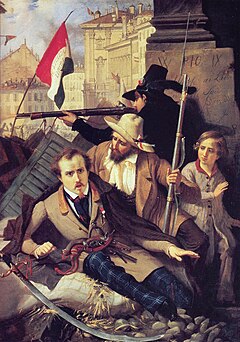Italian unification

Five Days of Milan, 18–22 March 1848
|
|
| Date | 1815–1871 |
|---|---|
| Location | Italy |
| Participants | Italian society, Kingdom of Sardinia, Provisional Government of Milan, Republic of San Marco, Kingdom of Sicily, Roman Republic, Carbonari, French Empire, Red Shirts, Hungarian legion, Southern Army, United Provinces of Central Italy, Kingdom of Italy |
| Outcome |
|
| Anniversary of Risorgimento | |
|---|---|

Monument to Italia Turrita in Reggio Calabria
|
|
| Observed by | Italy |
| Type | National |
| Significance | Proclamation of the Kingdom of Italy on 17 March 1861 |
| Celebrations | Parades, Fireworks, Concerts, Picnics, Balls, Trade shows |
| Date | 17 March |
| Frequency | every fifty years |
Italian unification (Italian: Unificazione italiana), or the Risorgimento ([risordʒiˈmento], meaning resurgence or revival), was the political and social movement that consolidated different states of the Italian peninsula into the single state of the Kingdom of Italy in the 19th century. The process began in 1815 with the Congress of Vienna and was completed in 1871 when Rome became the capital of the Kingdom of Italy. The memory of the Risorgimento is central to both Italian politics and Italian historiography, for this short period (1815–60) is one of the most contested and controversial in modern Italian history. Italian nationalism was based among intellectuals and political activists, often operating from exile.
After the fall of the Western Roman Empire, the Roman province of Italy remained united under the Ostrogothic Kingdom and later disputed between the Kingdom of the Lombards and the Byzantine (Eastern Roman) Empire. Following conquest by the Frankish Empire, the title of King of Italy merged with the office of Holy Roman Emperor. However, the emperor was an absentee foreigner who had little concern for the governance of Italy as a state; as a result, Italy gradually developed into a system of city-states.
This situation persisted through the Renaissance but began to deteriorate with the rise of modern nation-states in the early modern period. Italy, including the Papal States, then became the site of proxy wars between the major powers, notably the Holy Roman Empire (later Austria) and France.
...
Wikipedia
